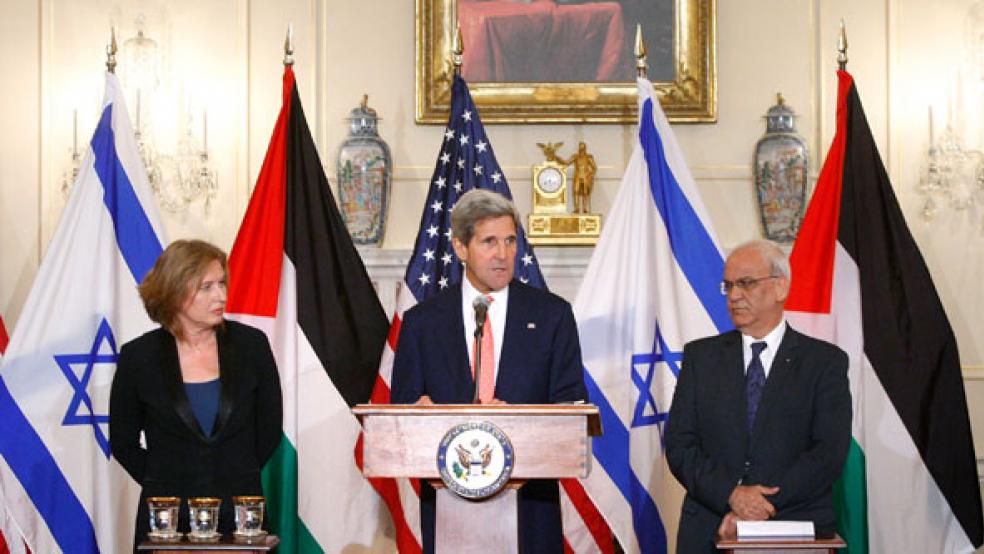Almost as soon as the talks between Israel and the Palestinians were announced Tuesday, officials from both sides began to paint a gloomy portrait of the prospects for peace.
Secretary of State John Kerry, who negotiated this 13th attempt to form a lasting peace in the region announced that the two sides had agreed to give the process nine months.
“Compromise doesn’t only mean giving up something or giving something away; reasonable, principled compromise in the name of peace means that everybody stands to gain,” Kerry said, flanked by lead negotiators Israeli Justice Minister Tzipi Livni and Palestinian envoy Saeb Erekat. “Each side has a stake in the other’s success, and everyone can benefit from the dividends of peace.”
Livni and Erekat are expected to begin talks within the next two weeks, with U.S. envoy Martin Indyk facilitating talks. It’s the first time the two sides have negotiated in three years. But it’s becoming clear that the two sides are far apart on the most important issues.
Yasser Abed Rabbo, a close confidant of Palestinian President Mahmoud Abbas, told Palestinian radio that "huge difficulties" lay ahead. He said that the number of issues that need to be settled makes it difficult to predict success.
"Putting all the dishes on the table at once may be an attempt to undermine the process," he said.
Israeli Finance Minister Yair Lapid added that Israel would not accept solution they did not believe were equitable. "What we are looking for is a fair divorce from the Palestinians, so that we can stand on one side of the border and they on the other," Lapid said.
Given U.S. strategic interests in the region, Indyk has his work cut out for him. And while Israel made a good faith gesture of releasing 104 Palestinian prisoners, there are numerous issues, as well as inherent distrust, to overcome. If the peace process is to succeed, these primary issues need to be resolved:
- The Palestinians want Israel to dismantle Jewish settlements in the Arab part of Jerusalem. Right now, there are 1,300 such settlements in the West Bank.
- The Jewish founding fathers envisioned a state that was both Jewish and democratic. Given current demographics, this can be accomplished through the creation of an independent Palestinian state.
The two-state solution idea has been floated for decades, but little progress has been made toward making it happen. - Palestinians want Israel to withdraw from all lands occupied since a war between the two sides in 1967. They want these areas of the West Bank to be part of any future Palestinian state.
In the past, Israel has refused, and has yet to show any indication that their historic position has changed. In fact, Prime Minister Benjamin Netanyahu and President Obama have publicly clashed over the U.S. assertion that Israel acknowledges the pre-1967 borders in negotiations. - Israel wants firm security guarantees from the Palestinian Authority. Given Hamas’ independence from mainstream Palestinian political movements, this is almost impossible for the authority to guarantee. Hamas is considered a terrorist organization by the United States and the European Union.
- The Palestinians want a capital in East Jerusalem, home to many Muslim and Jewish holy sites.
- Israel also wants the Palestinians to recognize officially the legitimacy of the State of Israel.
Here are two other important issues to keep in mind as negotiations begin:
- This is perhaps the last chance for the Obama administration to exert its influence in the Middle East. The White House has been powerless to shape events elsewhere in the region. That’s why it’s dangling a several billion dollars in rebuilding funds in front of the Palestinians.
- The Israelis have the upper hand in the talks. “The Israelis are vastly more powerful than the Palestinians. The playing field is not at all equal. The stronger state is going to take advantage of its position by using this long period of failed negotiations,” Philip Wilcox, a former U.S. ambassador in Jerusalem, told The Fiscal Times earlier this week.
The only hope for success? “Many Israelis understand their dream of an Israeli state is in danger. The future is bleak unless they come to a two-state solution,” he said.





